Related Research Articles

Joseph Rudyard Kipling was an English journalist, short-story writer, poet, and novelist. He was born in India, which inspired much of his work.

Sir Harry Paget Flashman is a fictional character created by Thomas Hughes (1822–1896) in the semi-autobiographical Tom Brown's School Days (1857) and later developed by George MacDonald Fraser (1925–2008). Harry Flashman appears in a series of 12 of Fraser's books, collectively known as The Flashman Papers, with covers illustrated by Arthur Barbosa. Flashman was played by Malcolm McDowell in the Richard Lester 1975 film Royal Flash.
"Gunga Din" is an 1890 poem by Rudyard Kipling set in British India. The poem is much remembered for its final line: "You're a better man than I am, Gunga Din".

Major General Sir Henry Havelock was a British general who is particularly associated with India and his recapture of Cawnpore during the Indian Rebellion of 1857.
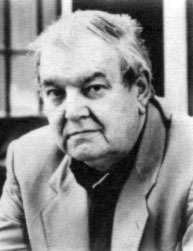
George MacDonald Fraser was a British author and screenwriter. He is best known for a series of works that featured the character Flashman.
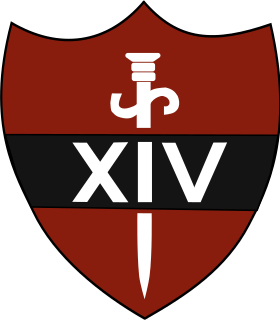
The British Fourteenth Army was a multi-national force comprising units from Commonwealth countries during the Second World War. As well as British Army units, many of its units were from the Indian Army and there were also significant contributions from British Army's West and East African divisions. It was often referred to as the "Forgotten Army" because its operations in the Burma Campaign were overlooked by the contemporary press, and remained more obscure than those of the corresponding formations in Europe for long after the war. For most of the Army's existence, it was commanded by Lieutenant-General William Slim.
The jezail or jezzail is a simple, cost-efficient and often handmade long arm commonly used in South Asia and parts of the Middle East in the past. It was popular amongst the Pashtun tribesmen, who deposed Shah Shuja. and were primarily utilized in the First and Second Anglo-Afghan Wars by Pashtun tribesmen.

The Barrack-Room Ballads are a series of songs and poems by Rudyard Kipling, dealing with the late-Victorian British Army and mostly written in a vernacular dialect. The series contains some of Kipling's best-known works, including the poems "Gunga Din", "Tommy", "Mandalay", and "Danny Deever", helping consolidate his early fame as a poet.
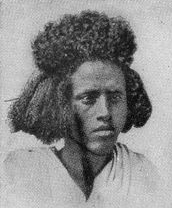
"Fuzzy-Wuzzy" is a poem by the English author and poet Rudyard Kipling, published in 1892 as part of Barrack Room Ballads. It describes the respect of the ordinary British soldier for the bravery of the Hadendoa warriors who fought the British army in the Sudan and Eritrea.

The Thin Red Line is American author James Jones's fourth novel. It draws heavily on Jones's experiences at the Battle of Mount Austen, the Galloping Horse, and the Sea Horse during World War II's Guadalcanal campaign. The author served in the United States Army's 27th Infantry Regiment, 25th Infantry Division.
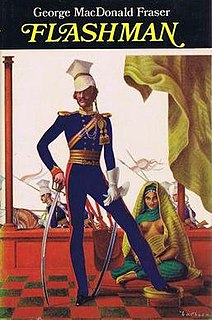
Flashman is a 1969 novel by George MacDonald Fraser. It is the first of the Flashman novels.
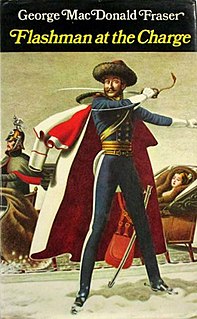
Flashman at the Charge is a 1973 novel by George MacDonald Fraser. It is the fourth of the Flashman novels. Playboy magazine serialised Flashman at the Charge in 1973 in their April, May and June issues. The serialisation is unabridged, including most of the notes and appendixes and features a few illustrations, collages from various paintings and pictures to depict a period montage of the Charge and Crimea.

Gunga Din is a 1939 American adventure film from RKO Radio Pictures directed by George Stevens and starring Cary Grant, Victor McLaglen, and Douglas Fairbanks Jr., loosely based on the 1890 poem of the same name by Rudyard Kipling combined with elements of his 1888 short story collection Soldiers Three. The film is about three British sergeants and Gunga Din, their native bhisti, who fight the Thuggee, an Indian murder cult, in colonial British India.

Nicholson's Obelisk, or 'Nicholson's Memorial', is a monument in Pakistan, erected in 1868 in honour of Brigadier-General John Nicholson, a famous military figure of the British Empire.

Major General David Tennant Cowan CB, CBE, DSO & Bar, MC, also known as "Punch" Cowan, was an officer in the British Army and British Indian Army in World War I and World War II. He led the 17th Indian Infantry Division during almost the entire Burma campaign.
The Sheikh and the Dustbin is the third and last collection of short stories by George MacDonald Fraser, featuring a young Scottish officer named Dand MacNeill. It is a sequel to The General Danced at Dawn and McAuslan in the Rough and concerns life in a Highland Regiment after the end of the Second World War.

The Flashman Papers is a series of novels and short stories written by George MacDonald Fraser, the first of which was published in 1969. The books centre on the exploits of the fictional protagonist Harry Flashman. He is a cowardly British soldier, rake and cad who is placed in a series of real historical incidents between 1839 and 1894. While the incidents and much of the detail in the novels have a factual background, Flashman's actions in the stories are either fictional, or Fraser uses the actions of unidentified individuals and assigns them to Flashman. Flashman is a character in the 1857 novel by Thomas Hughes, Tom Brown's School Days; Hughes' version of the character is a bully at Rugby School who is expelled for drunkenness. The character was then developed by Fraser, and appeared in the 1969 novel Flashman. Fraser went on to write a total of eleven novels and one collection of short stories featuring the character.
Ali Mirdrekvandi, is the author of No Heaven for Gunga Din, a fable, and Irradiant, a popular epic, both written in broken English in the mid-20th century.
Naples '44: An Intelligence Officer in the Italian Labyrinth is a military memoir of the Second World War written by the British travel writer and novelist Norman Lewis that was first published in 1978.
Gerard Francis Cobb was Junior Bursar of Trinity College, Cambridge. He was active as an Anglican layman, organist and amateur composer.
References
- ↑ Stanley Reynolds, "George MacDonald Fraser: He created Harry Flashman, tormentor of Tom Brown turned comical anti-hero", The Guardian, 4 January 2008 accessed 23 November 2012
- ↑ John Keegan, The Second World War (London, Penguin Books, 2005), p. 79.
- ↑ David Mamet, "So near so noir", The Guardian 9 November 2001 accessed 23 November 2012
- ↑ Rudyard Kipling. "Gunga Din". Poetryfoundation.org. Retrieved 31 December 2021.